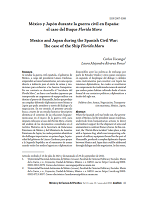Mexico and Japan during the Spanish Civil War: The case of the Ship Florida Maru
DOI:
https://doi.org/10.32870/mycp.v11i31.783Keywords:
Weapons, Negotiation, Maritime Transportation, Mexico, JapanAbstract
When the Spanish civil war broke out, the government of Mexico, led by president Lázaro Cárdenas, undertook from humanitarian actions to direct and indirect support for the shipment of arms and ammunition to confront Franco’s forces. In this con-text, the “Florida Maru incident” takes place, a ship with a Japanese flag, which was transporting a shipment of military equipment bound for the port of Manzanillo, produced a complex diplomatic dispute between Mexico and Japan that could be addressed through dialogue and the negotiation. In this sense, this article seeks, through a descriptive-historical analysis, to identify the context of Spanish-Mexican relations in the framework of the civil war; and then focus on the analysis of the Florida Maru through the analysis of the documents consulted in the historical archives of the Secretary of Foreign Affairs of Mexico and the Ministry of Foreign Affairs of Japan, which allow us to identify two important findings: In the first place , the priority of the Lázaro Cárdenas government to support the Second Republic in supplying arms using all the logistical and diplomatic means available to the embargo policies of the United States and other European countries; second, the deployment of dialogue and lobbying as instruments to resolve diplomatic tensions with Japan, which were resolved without compromising the traditional ties of friendship that both countries had cultivated since the formal beginning of their political and diplomatic contacts at the end of the century XIX.Downloads
References
Archivo Histórico Genaro Estrada (AHGE). (1937). Florida Maru: Buque Japonés.
Clasificación Topográfica: III-361-16. México: Archivo Histórico Diplomático, Secretaria de Relaciones Exteriores.
Benítez, F. (1977). La política internacional del General Cárdenas. En F. Benítez,
Lázaro Cárdenas y la Revolución Mexicana III: El cardenismo. México: Fondo de Cultura Económica.
Bieber, L. (2000). El comercio germano-boliviano 1936-1939. Un fracaso singular en el contexto del comercio de compensación de Alemania con América latina. En N. Bottcher & B. Hausberger (Eds.), Dinero y negocios en la historia de América Latina: 20 ensayos dedicados a Reinhard Liehr (pp.487-516). Instituto Ibero-Americano.
Cantero, E. (2009). Una lectura de la Guerra Civil española. Verbo, (475-476),
-518.
Compact Aimed at Moscow. Japan, Germany, Italy Will Sign Treaty In
Rome. (1937, noviembre 5). The Japanese American News, p. 1. https://hojishinbun.hoover.org/?a=d&d=jan19371105-01&e=-------en-10--1--img---------
Espasa, A. (2017, enero-junio). La conexión mexicana: Cárdenas, Roosevelt y la Guerra Civil Española. Estudios de Historia Moderna y Contemporánea de México, (53), 21-37. https://doi.org/10.1016/j.ehmcm.2017.02.003
Fukuzawa, Y. (1995). La Guerra Civil Española y la Guerra Chino-Japonesa.
Revista Española del Pacífico, (5), 195-204.
Hernández, S. (2015). Los intereses del Imperio japonés en México durante la década de 1930. XXXVI Jornadas de Historia de Occidente, 163-176.
Japan Center for Asia Historical Records (JACAR). (1937a). Incident of “Floridamaru”. Reference Code: B02031536700, Vol. 3(A-6-0-0-1_12_1_003),
Reel A-6017. Diplomatic Archives of the Ministry of Foreign Affairs,
https://www.jacar.archives.go.jp/aj/meta/listPhoto?LANG=eng&BID=F2006092115231945540&ID=M2006092115232245593&REFCODE=B02031536700
Japan Center for Asia Historical Records (JACAR). (1937b). Incident of “Florida-
maru”. Reference Code: B02031536600, Vol. 3(A-6-0-0-1_12_1_003),
Reel A-6017. Diplomatic Archives of the Ministry of Foreign Affairs,
https://www.jacar.archives.go.jp/aj/meta/listPhoto?LANG=eng&BID=F2006092115231945540&ID=M2006092115232245591&REFCODE=B02031536600
Lezamiz, J. (2015). La conexión mexicana: armas y alimentos para la República.
Revista Electrónica Iberoamericana, 9(1), 25-41. https://www.urjc.es/images/ceib/revista_electronica/REIB_vol_9_2015_1_completo.pdf
Márquez, J. (2010). La política exterior del cardenismo. En S. León y González
(Coord.), El cardenismo, 1932-1940 (pp. 370-435). Fondo de Cultura
Económica, CIDE, Conculta, INEHRM, Fundación Cultural de la Ciudad de México.
Ochoa Bilbao, L., Prado Lallande, J. P., & Ayala Brito, J. (2019). Isidro Fabela: contexto mundial y derecho internacional en la política exterior de la
Revolución. Revista IUS, 13(43), 207-229. https://doi.org/10.35487/rius.v13i43.2019.429
Ojeda Revah, M. (2004). México y la Guerra Civil española. Turner.
Rodao, F. (1993). Relaciones Hispano-Japonesas, 1937-1945 [Tesis Doctoral,
Universidad Complutense de Madrid].

Downloads
Published
Versions
- 2022-01-24 (3)
- 2021-12-14 (2)
- 2021-12-14 (1)
How to Cite
Issue
Section
License
Copyright (c) 2021 México y la Cuenca del Pacífico

This work is licensed under a Creative Commons Attribution-NonCommercial-ShareAlike 4.0 International License.
Open Access Policy
This journal provides open access to all its contents, in adherence to the principle that making research freely available supports a greater global exchange of knowledge.
MyCP is licensed under a Creative Commons Attribution-NonCommercial license, also known as CC BY-NC.
Contents are published in both PDF and XML formats.
Authors who publish in México y la Cuenca del Pacífico must accept the following conditions:
Pursuant to Mexican copyright laws, México y la Cuenca del Pacífico acknowledges and respects the authors’ moral right and ownership of property rights, which will be assigned to the University of Guadalajara to publish the articles in an open-access mode.
México y la Cuenca del Pacífico does not charge the authors any fees for receiving and processing their articles.
Authors are permitted to enter into other independent and additional contractual agreements for the non-exclusive distribution of the article version published in México y la Cuenca del Pacífico (for example, publishing it in an institutional repository or in other printed or electronic media) as long as they clearly state that the piece was originally published in México y la Cuenca del Pacífico.
Pursuant to the above, once the article is approved for publication, authors must send the Assignment of Rights Agreement form duly filled and signed. This form must be sent to mexicoylacuenca@gmail.com as a PDF file.
Readers/users of México y la Cuenca del Pacífico can freely access the journal new issues as soon as they are uploaded. Readers/users are allowed to cite, share (both electronically and physically), print and distribute the material, provided they expressly state that the work was originally published in México y la Cuenca del Pacífico. Contents are to be properly cited and never for commercial purposes.




